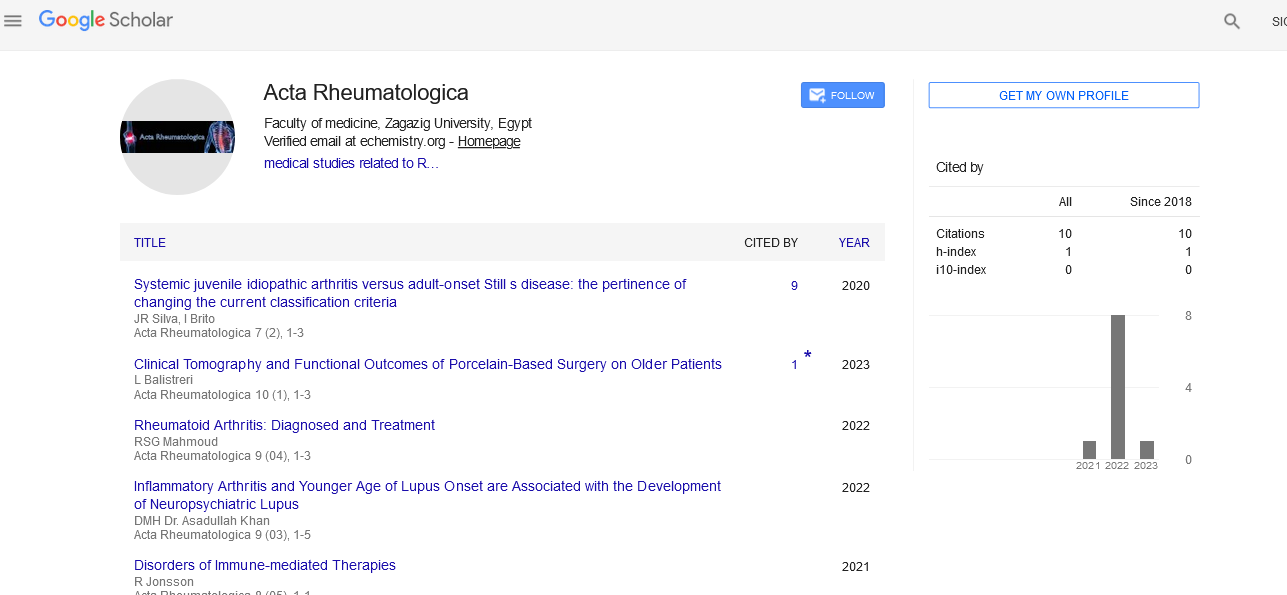Perspective - (2024) Volume 11, Issue 3
Unveiling the Power of Clinical Trials: Advancing Medicine Through Rigorous Research
George E. Fragoulis*
Department of Medicine, University of Patras, Patras, Greece
*Correspondence:
George E. Fragoulis, Department of Medicine, University of Patras, Patras,
Greece,
Email:
Received: 21-May-2024, Manuscript No. IPAR-24-14804;
Editor assigned: 24-May-2024, Pre QC No. IPAR-24-14804 (PQ);
Reviewed: 07-Jun-2024, QC No. IPAR-24-14804;
Revised: 18-Jun-2024, Manuscript No. IPAR-24-14804 (R);
Published:
25-Jun-2024
Introduction
Effective clinical trials serve as the cornerstone of medical
research, providing a systematic framework for evaluating the
safety, efficacy, and effectiveness of novel treatments,
interventions, and preventive strategies. From groundbreaking
discoveries to transformative innovations, clinical trials play a
pivotal role in shaping medical practice, improving patient
outcomes, and driving progress in healthcare. In this article, we
delve into the world of clinical trials, exploring their purpose,
phases, design considerations, ethical principles, and the
indispensable contributions of participants and researchers in
advancing medical science.
The purpose and importance of clinical trials is clinical trials
are research studies designed to evaluate the safety, efficacy,
and tolerability of investigational drugs, devices, procedures, or
interventions in human subjects. By systematically collecting
data on treatment outcomes, adverse events, and long-term
effects, clinical trials provide essential evidence to inform clinical
decision-making, regulatory approvals, and healthcare policies.
Moreover, clinical trials serve as engines of innovation, driving
scientific discovery, fostering collaboration among academia,
industry, and government agencies, and translating laboratory
findings into tangible benefits for patients and society.
Description
Phases of clinical trials
Clinical trials typically progress through a series of sequential
phases, each serving distinct objectives and research questions:
Phase I trials focus on evaluating the safety, pharmacokinetics,
and pharmacodynamics of a novel intervention in a small cohort
of healthy volunteers or individuals with the target condition.
These studies aim to identify the maximum tolerated dose,
assess preliminary efficacy, and inform dose-ranging strategies
for subsequent phases.
Phase II trials expand the investigation to a larger cohort of
patients with the target condition, assessing the efficacy, optimal
dosing regimen, and potential therapeutic benefits of the
intervention. These studies provide critical insights into treatment
response rates, biomarker endpoints, and dose response
relationships, guiding decisions regarding further development
and progression to phase III trials.
Phase III trials, also known as pivotal trials, aim to definitively
evaluate the efficacy, safety, and comparative effectiveness of
the investigational intervention compared to standard of care or
placebo in a large, diverse patient population. These studies are
designed with rigorous methodologies, including randomization,
blinding, and controlled allocation, to minimize bias and ensure
robust statistical inference.
Phase IV trials, or post-marketing surveillance studies, are
conducted after regulatory approval to monitor the long-term
safety, effectiveness, and real-world outcomes of the
intervention in a broader patient population. These studies
provide valuable insights into rare adverse events, treatment
adherence, health outcomes, and comparative effectiveness in
diverse patient populations and clinical settings.
Design considerations and methodological rigor
The design of clinical trials is guided by principles of scientific
rigor, methodological integrity, and ethical conduct to ensure the
validity, reliability, and generalizability of research findings. Key
considerations in trial design include the selection of appropriate
study endpoints, sample size calculations, randomization
procedures, blinding methods, and statistical analysis plans.
Moreover, ethical principles, including respect for autonomy,
beneficence, nonmaleficence, and justice, underpin participant
recruitment, informed consent processes, data privacy, and
protection of human subjects' rights and welfare.
Innovations in clinical trial design
Advancements in clinical trial design methodologies have
transformed the landscape of clinical research, enabling more
efficient, cost-effective, and patient-centered approaches to
evidence generation. Adaptive trial designs, such as adaptive
dose-finding, seamless phase II/III trials, and Bayesian adaptive
designs, allow for real-time modifications to study protocols
based on interim data analyses, optimizing resource allocation,
and accelerating the pace of drug development. Additionally,
pragmatic trials, comparative effectiveness research, and
Patient-Centered Outcomes Research (PCOR) prioritize real-world effectiveness, patient preferences, and clinical relevance,
enhancing the translation of research findings into clinical
practice and healthcare decision-making.
Participant recruitment and engagement
The successful conduct of clinical trials hinges on the active
participation and engagement of study participants, who
volunteer their time, effort, and personal health information to
advance medical science and improve patient care. Participant
recruitment strategies encompass diverse outreach methods,
including community engagement, social media, patient
advocacy groups, and healthcare provider referrals, aimed at
enhancing study enrollment, retention, and diversity. Moreover,
fostering open communication, transparency, and trust between
researchers and participants is essential in ensuring informed
consent, addressing participant concerns, and promoting
adherence to study protocols.
Challenges and opportunities in clinical trials
Despite their invaluable contributions to medical progress,
clinical trials face numerous challenges, including recruitment
and retention barriers, regulatory complexities, resource
constraints, and ethical dilemmas. Addressing these challenges
requires innovative solutions, collaborative partnerships, and
stakeholder engagement across academia, industry, government
agencies, patient advocacy groups, and regulatory bodies.
Moreover, leveraging emerging technologies, such as
telemedicine, wearable devices, digital health platforms, and
artificial intelligence, holds promise for enhancing trial efficiency,
remote monitoring, and patient-centered care delivery.
Conclusion
Clinical trials represent a cornerstone of medical research,
driving scientific discovery, innovation, and progress in
healthcare. By adhering to principles of scientific rigor,
methodological integrity, and ethical conduct, clinical trials
generate robust evidence to inform clinical decision-making,
regulatory approvals, and healthcare policies. Moreover, the
active participation and engagement of study participants are
essential in ensuring the success and impact of clinical research
endeavors. As we continue to navigate the dynamic landscape of
clinical trials, armed with knowledge, collaboration, and a
commitment to patient-centered care, we forge a path towards
a future where medical advances improve health outcomes and
quality of life for individuals worldwide.
Citation: Fragoulis GE (2024) Unveiling the Power of Clinical Trials: Advancing Medicine through Rigorous Research. Acta Rheuma Vol:11 No:3





